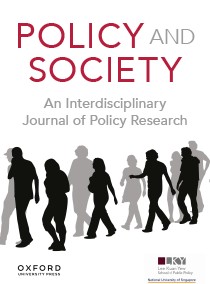保持对技术化公共部门的信任
IF 6.1
1区 社会学
Q1 POLITICAL SCIENCE
引用次数: 3
摘要
新兴技术渗透并潜在地破坏了我们广泛的社会、经济和政治关系。包括教育、执法和医疗保健在内的各种国家机构越来越依赖技术组件,如自动决策系统、电子政务系统和其他数字工具,以提供廉价、高效的公共服务,以及所谓的公平、透明、公正和负责任的公共管理。人们对各种基于区块链的解决方案的兴趣越来越大,从中央银行数字货币,到通证化的教育证书,再到基于分布式账本的土地登记,再到自我主权身份,这是标准化、客观化、自动化、技术官僚化和技术化公共管理的漫长历史中最新的、仍然大部分未写的篇章。公共服务的快速、(通常)无计划和不受控制的技术化(如在冠状病毒病(COVID)封锁期间仓促采用远程学习和电话会议系统所发生的情况)引发了关于使用新技术组件的复杂问题,这些组件最终可能适合也可能不适合所使用的任务。在一个对政府信任度下降的时代,我们能否信任公共部门在提供公共服务时使用的技术基础设施是一个核心问题:如果政府检测福利欺诈的人工智能系统失灵,公众对政府的信心最终会受到打击。在本文中,我们对公共部门使用可能不值得信任的(私人)技术系统(包括基于区块链的系统)可能如何影响对政府的信任进行了批判性评估。然后,我们提出了几个政策选择,以保护对政府的信任,即使他们的一些技术组件被证明从根本上不值得信任。本文章由计算机程序翻译,如有差异,请以英文原文为准。
Maintaining trust in a technologized public sector
Emerging technologies permeate and potentially disrupt a wide spectrum of our social, economic, and political relations. Various state institutions, including education, law enforcement, and healthcare, increasingly rely on technical components, such as automated decision-making systems, e-government systems, and other digital tools to provide cheap, efficient public services, and supposedly fair, transparent, disinterested, and accountable public administration. The increased interest in various blockchain-based solutions from central bank digital currencies, via tokenized educational credentials, and distributed ledger-based land registries to self-sovereign identities is the latest, still mostly unwritten chapter in a long history of standardized, objectified, automated, technocratic, and technologized public administration. The rapid, (often) unplanned, and uncontrolled technologization of public services (as happened in the hasty adoption of distance-learning and teleconferencing systems during Corona Virus Disease (COVID) lockdowns) raises complex questions about the use of novel technological components, which may or may not be ultimately adequate for the task for which they are used. The question whether we can trust the technical infrastructures the public sector uses when providing public services is a central concern in an age where trust in government is declining: If the government’s artificial intelligence system that detects welfare fraud fails, the public’s confidence in the government is ultimately hit. In this paper, we provide a critical assessment of how the use of potentially untrustworthy (private) technological systems including blockchain-based systems in the public sector may affect trust in government. We then propose several policy options to protect the trust in government even if some of their technological components prove fundamentally untrustworthy.
求助全文
通过发布文献求助,成功后即可免费获取论文全文。
去求助
来源期刊

Policy and Society
Multiple-
CiteScore
18.00
自引率
6.50%
发文量
43
审稿时长
30 weeks
期刊介绍:
Policy and Society is a prominent international open-access journal publishing peer-reviewed research on critical issues in policy theory and practice across local, national, and international levels. The journal seeks to comprehend the origin, functioning, and implications of policies within broader political, social, and economic contexts. It publishes themed issues regularly and, starting in 2023, will also feature non-themed individual submissions.
 求助内容:
求助内容: 应助结果提醒方式:
应助结果提醒方式:


